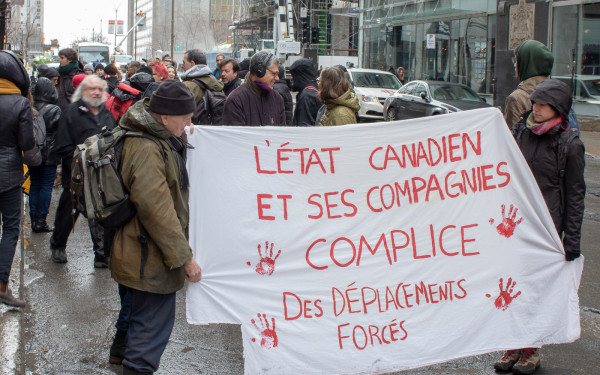Flight Status: Deporting
Solidarity Across Borders Appeals to Passengers to Stop Deportation of Minor
On the day he turned 17, Daniel* got more than cake and presents. He was placed in a detention centre and given a plane ticket to Mexico.
Having switched high schools as a result of problems with missing documents, the Mexican-born teenager went to his old school in St. Léonard to visit friends on his birthday.
When it started raining, the group moved inside, which led someone from the high school to call police. When Daniel was caught without papers, he was arrested and sent to the Laval detention centre for immigrants.
A week later, he was escorted onto Aeromexico’s flight 681 at 10 a.m., separated from his mother and teenage sister.
Solidarity Across Borders was at the Pierre Elliott Trudeau airport in Dorval, where a group of 25 protesters stood in front of Aeromexico’s check-in counter, encouraging passengers to stop the flight.
“We organized this all last-minute,” said Camille Bonenfant from Solidarity Across Borders. “[It’s now] Thursday; it’s been a week since all this happened.”
Passengers can stop a flight by refusing to sit down, or causing a scene until the pilot removes the person being deported or cancels the flight. It’s a tactic that hasn’t been used in North America to stop deportations, but has already been successful in Europe.
In April, passengers stopped a Swedish flight when they refused to put on their seat belts. The plane held a Kurdish refugee who was forced to apply for Swedish residency from his home country of Iran, because of an irregularity in Swedish immigration laws.
“In any case, the border service agency can put the person on the next flight,” said activist Jaggi Singh. “But at least this shows some symbolic opposition to the whole deportation regime.”
Deportations like this happen nearly every day. On the morning of Oct. 16 four other families were seen checking in to the 10 a.m. flight, escorted by security. Activists appealed to the line of passengers waiting to bag-check as one family of six rearranged their belongings on
the airport floor, moving things between bags to keep under the weight limit.
Solidarity Across Borders discovered another case of a detained deportee—making six deportations in total on Oct. 16 alone.
“Deportations here, all of them happen beyond the glare of knowing anything is happening,” Singh said. “There’s no special armed guards, there’s no shackles, no handcuffs.
“It’s like people are just getting on a flight.”
Daniel’s deportation is also controversial because he is a minor travelling without the consent of a parent, something border police rarely allow for Canadians.
The boy left on his own because he refused to give up his family’s whereabouts and jeopardize their chances at receiving legal status. Daniel’s family is in the midst of applying for residency on humanitarian grounds and he will be able to return when their request is approved.
“He didn’t want them to all be deported at the same time,” said Karen Reyes, who works with the universal education advocacy group Education Without Borders.
After all the passengers had checked in and moved through customs, the protesters marched through the airport to the customs line. There they chanted and stated their purpose using a megaphone, to the dismay of the dozen airport security and police officers.
As the departure time approached, the group huddled waiting for news from acquaintances on board. By 10:15 a.m. the flight had taken off.
Schools: Places of Refuge?
Daniel was visiting his old school to see his old friends on his birthday when he was arrested. Despite the trouble with administration over school tuition and his lack of documents that forced him to switch schools, the activists who worked with him describe him as a typical kid.
“He won the best student award at his secondary school,” said Romina Hernández from Solidarity Across Borders. “He loves math.”
Martin from Education Without Borders, who declined to give his last name, says Daniel’s arrest and subsequent deportation is exactly why schools need to put a confidentiality system in place.
“It’s the first case that was brought to our attention where a school was the place of an arrest that led to a deportation,” said Martin.
Schools don’t have a role in citizenship issues and should avoid asking for a student’s residency status, he said. If the information is collected, it should never be used against them and sent to police.
Attending elementary and high school becomes a delicate situation for students missing legal documents in Quebec. Some papers allow students to attend classes for free but won’t grant them a diploma when they finish their studies.
Without other papers, students are forced to pay for public schooling, which is free for residents. These fees can add up to $5,000 or $6,000, an amount of money most non-status families don’t have.
School boards in Toronto have already adopted a “Don’t Ask, Don’t Tell” policy, securing the right to education for all children under 18, regardless of their residency status. But Martin says there is still work to be done concerning free tuition.
As of Monday, The Link was told Daniel is still being followed by Mexican child services known as the DIF, which can decide to keep him within the institution until he turns 18.
The DIF is controversial within Mexico. The head of the municipal DIF in the town of Iguala, Maria de los Angeles Pineda, is wanted in connection with the mass murder of 43 college students, who went missing after protesting Pineda’s husband’s rule as mayor.
Solidarity Across Borders is part of an international network opposing borders and deportations. They are calling for equal human rights and equal access to opportunities, regardless of nationality.
“These systems of filtering out who belongs and who doesn’t belong are fundamentally unjust,” said Singh.
*The name of the minor is kept secret for privacy reasons at the request of his family.

_900_672_90.jpg)



1_600_375_90_s_c1.jpg)
2_600_375_90_s_c1.jpg)
